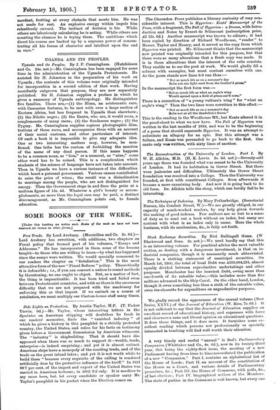Side Lights on Protection. By Austin Taylor, M.P. (T. Fisher
Unwin. 6d.)—Mr. Taylor, whose interesting letters in the Spectator on American shipping will doubtless be fresh in our readers' memories, finds the "vanished industry" of which he gives a history in this pamphlet in a strictly protected country, the United States, and relies for his facts on testimony given before a Government Commission by American witnesses. The " industry " is shipbuilding. That it should have dis- appeared when there was so much to support it—wealth, trade, enterprise—is indeed surprising ; and yet it is almost extinct. American ships have a monopoly of the coasting trade, and of the trade on the great inland lakes ; and yet it is not worth while to build them "because every requisite of the calling is rendered artificially dear by the protective influence of the tariff." In 1821 881 per cent, of the import and export of the United States was carried in American bottoms; in 1902 92 only. It is needless to say more here, but let every candidate or speaker carry Mr. Taylor's pamphlet in his pocket when the Election comes on. The Clarendon Press publishes a literary curiosity of very con- siderable interest. This is Hyperion : Keats' Manuscript of the Poem, with a fragment, The Pall of Hyperion : a Dream, with Intro- duction and Notes by Ernest de Selincourt (subscription price, 42 12s. 6d.) Another manuscript was known to editors; it had been copied by direction of Richard Woodhouse, " reader " to Messrs. Taylor and Hessey, and it served as the copy from which Hyperion was printed. Mr. Selincourt thinks that the manuscript now printed was originally intended for this purpose, but that there were so many alterations that a fresh copy was made. It is in these alterations that the interest of the relics consists. They enable us to see the poet at work. We would gladly fill a column with examples, but must content ourselves with one. As the poem stands now lines 8-9 run thus :— " Not so much life as on a summer's day Bobs not one light seed from the feather'd grass."
In the manuscript the first form was :—
"Not so much life as what an eagle's wing Would spread upon a field of green-ear'd corn."
There is a correction of "a young vulture's wing" for "what an eagle's wing." Then the two lines were rewritten to this effect :— " Not so much life as on a summer's day Robs not at all the dandelion's fleece."
This is the reading in the Woodhouse MS., but Keats altered it in the proof-sheet to what we now have. The Pall of Hyperion was written in the last months of 1819, and was to be the beginning of a poem that should supersede Hypes-ion. It was an attempt to substitute an allegory for an epic. But this attempt was a failure, and Keats was persuaded to go beak to the first. One canto only waa written, with sixty lines of another.






































 Previous page
Previous page